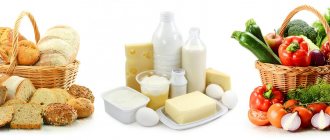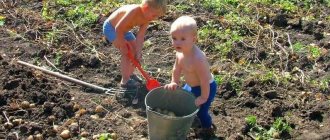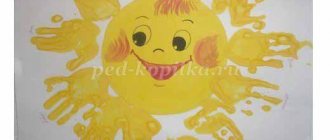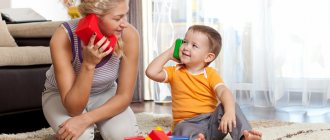Objectives of the family club
- to intensify the work of the institution with parents (legal representatives) of pupils, the creation of a social and pedagogical environment “child-kindergarten-family”;
- provide psychological and pedagogical assistance to parents (legal representatives) in creating a favorable psycho-emotional climate in children’s families;
- improve the psychological and pedagogical culture of parents;
- to form positive attitudes in raising children;
- harmonization of parent-child relationships;
- contribute to the establishment of trusting relationships between parents and kindergarten.
Thematic planning of the family club "Commonwealth"
| № | Topics of the meetings | Form of conduct | Term |
| 1 | Me and my child | Workshop | September |
| 2 | Happiness is when we are all together | Child-parent training | November |
| 3 | Play together | Joint activity between parents and children | January |
| 4 | We are together | Child-parent training | March |
| 5 | Learning to Express Anger | Joint activity between parents and children | May |
A set of materials on how a psychologist works with parents
The kit includes the family club "COMMONWEALTH" with notes of events + visual information for parents
MAGAZINE Preschooler.RF
Parents' club meeting on the topic “Being healthy is great!”Explanatory note
In the age of information and communication technologies, when parents are constantly overwhelmed by the flow of information, work, and everyday problems, they have almost no time left to read or listen to the teacher’s consultation, read information in the parent’s corner, or simply talk longer with the teacher about their child. Therefore, in our kindergarten, meetings with parents are interactive, educational in nature: short in time, voluminous in content. It depends on the teacher how fully the parent will remember the material offered to him, but the most important task is to find such words so that they will sink into the parent’s soul and heart for a long time, and make him think about his main role - raising his child.
In accordance with the Federal State Educational Standard for Preschool Education, one of the main principles of preschool education is the cooperation and interaction of the preschool educational institution with the family to ensure the full development of the child’s personality.
Cooperation is communication “as equals” , where no one has the privilege to indicate, control, or evaluate.
Interaction is a way of organizing joint activities that are carried out through communication.
Cooperation between teachers and parents allows you to get to know the child better, see him in different situations, and, therefore, help in understanding his individual characteristics, developing his abilities, and forming valuable life orientations.
To enhance the educational capabilities of parents, it is advisable for a teacher to use a variety of active forms of communication with them: discussion meetings, workshops, trainings, joint leisure activities for adults and children, folklore family evenings, educational and game quizzes, meetings of parent clubs and much more.
The joint activities of the teacher and parents contribute to the creation of a favorable climate in the family, the psychological and emotional comfort of the child in kindergarten and beyond.
Parents' club meeting on the topic “Being healthy is great!”
Goal: Building effective interaction with the families of pupils and increasing the competence of parents on the issues of maintaining and strengthening the physical and mental health of preschoolers.
Tasks:
- identification of key problems and factors influencing the health of children
- contribute to the creation of an emotionally favorable atmosphere in the family
- creating positive family education experiences
- promotion of healthy lifestyles.
Preliminary work: survey of parents on the topic of the parent club meeting, preparation of video material, cards “Harmful and Healthy Products” , teaching aid: “Answer the question” , development of a memo for parents, design of an announcement - invitation.
Participants: parents of the preparatory group, teacher.
Progress of the meeting:
Educator: Good evening, dear parents! I am glad to welcome you to the meeting of the parents' club. The topic of today’s meeting: “It’s great to be healthy!” At the beginning of our conversation, I want to ask: “Do you like cake?” (answers)
(there is a picture of a cake on the easel)
I suggest you bake a “Health Cake” . Do you agree?
A regular cake contains a variety of ingredients. We will look at the main components of a healthy lifestyle. What do you think is needed to keep our children healthy? (suggested answers)
Educator: Yes, you are right. Proper nutrition affects the health of our children.
And the first task for you. On the card with the picture of the products, mark the harmful products with a red tick.
Educator: So, we baked the first piece called “proper nutrition” and sent it to our cake.
(attach the “piece” to the cake)
Educator: You talked about playing sports, hiking, outdoor games, cycling and rollerblading. We will call all this “physical development” . And this is the next component of a healthy lifestyle.
Second task for you. Questions are hidden in plastic containers. I suggest you take one container at a time, read the question and answer it.
Questions:
- Continue the proverb: “If you want to be healthy -...” (toughen up)
- What weather can you go for a walk with your child? (any)
- The beginning of the path to the finish (start)
- It is the key to health (cleanliness)
- Likes to walk in the forest and sleep in a tent (tourist)
- This is not a tourist at all. Climbing up the mountain... (climber)
- I twist it with my hand, and on my neck, and with my foot,
- And I twist it around my waist, and I don’t want to drop it (hoop)
* To learn to swim faster, we need to go to... (swimming pool)
* Both from the wind and from the heat, It will protect you from the rain. How sweet it is to sleep in it! What is this? (tent)
* Bent over the river - Their agreement is this: The Okunka River will exchange her for a worm (fishing rod)
* In an open field near a birch tree, stripes are visible in the snow. The fox came closer: “Someone’s skis were running here.”
Educator: Physical education is good for health. By moving, the child actively develops and learns about the world around him.
And we put the next “piece” called “physical development” on the cake.
Parent: If we are talking about physical development, I suggest you do some exercises to relieve fatigue.
First exercise:
- Lower your chin as low as possible, slowly turn your head to the right and then to the left. Repeat the exercise 5 times in each direction.
- Place your palms together and quickly rub them together until you feel intense heat, then shake your relaxed hands 5 times.
- Close your eyes tightly for 5 seconds, then open them and mentally count to five (repeat the exercise 3 times).
- Rise up on your toes until your heels are about 1cm off the ground, then lower to the floor. Repeat this shaking 5-6 times.
Educator: Thank you (parent’s name), we will definitely do these exercises. I hope you got some rest? And we continue. You talked about taking walks in the fresh air. But in order to have fresh and clean air, we all need to protect the environment. How do you teach children to take care of the world around them from personal experience? (parents' answers)
Educator: We, in kindergarten, also pay great attention to environmental education. Our children know that environmental protection is one of the global problems of our state. You know that our group recently completed a quest - the game “Young Ecologist” . I bring to your attention a fragment of this quest (video fragment).
Educator: So, we also place the next “piece” - “environment” on our cake.
Educator: Our cake is almost ready. One component is missing. What else do you think can affect the health of our children? (if parents find it difficult to answer, the teacher comes to the rescue)
If a child is smiling, talkative, friendly, and easily makes contact with people around him, this is an emotionally prosperous child. So what do we call the last piece? ( "emotional well-being" )
Educator: and now, I suggest you watch the social video “Find time for me!” .
Educator: In the midst of the daily bustle, don’t forget - hug your child, tell him that you love him! (the teacher places the last “piece” - “emotional well-being” )
Educator: Our cake is ready. Let's all name its components together.
Educator: I recently read the parable “Four Candles” . And I want to tell you about it.
“Four candles burned calmly and slowly melted. There was such silence that you could hear them talking.
The first one said:
- I am Calm... Unfortunately, people don’t know how to keep me. I think I have no choice but to go out!
And the light of this candle went out.
The second one said barely audibly:
- I am Vera... Unfortunately, no one needs me. Therefore, there is no point in me burning further.
As soon as she fell silent, a light breeze blew and extinguished the candle.
The third candle became sad:
- I am Love... I no longer have the strength to maintain my flame. People don’t appreciate me and don’t understand me,” she said and went out.
Suddenly a child entered the room and, seeing three extinguished candles, began to cry in fear:
- What are you doing!? You must burn - I'm afraid of the dark!
The fourth candle said:
- Don't be afraid and don't cry! While I'm burning, I can always light the other three candles. After all, I am Hope.”
Educator (lights three extinguished candles): So let's not extinguish the fire of peace, love and faith in our hearts, and hope will help us.
Reflection.
Educator: Tell us about your impressions. What did you like? What were you missing?
Educator: Allow me to announce the decision of our meeting:
Whether you want it or not, But the point, comrades, is that, first of all, we are parents, And everything else comes later!
Educator: And at the end of our meeting, I want to give you a “reminder” - “Always remember...”
| Next > |



